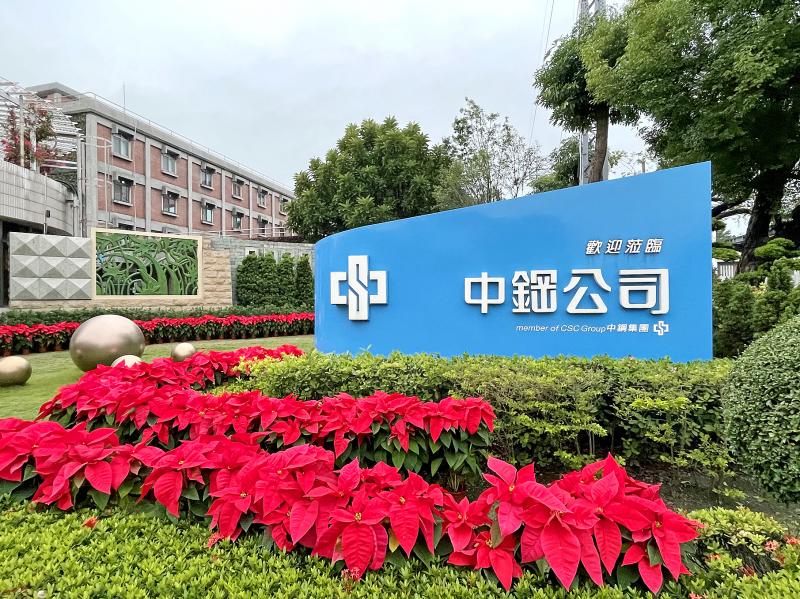China Steel Corp (中鋼), the nation’s largest steelmaker, yesterday said it would cut domestic steel prices by 2.1 percent on average for delivery next month in response to a brief slowdown in steel demand and to help customers mitigate mounting manufacturing costs caused by geopolitical issues.
However, the company said it expects steel demand to pick up in the second half of the year, benefiting from infrastructure programs in China, as lockdowns there could gradually be lifted later this year, as well as post-war reconstruction projects, if Russia’s war in Ukraine stabilizes.
The Kaohsiung-based company’s move matches its Chinese counterparts’ recent downward price adjustments, it said in a statement.

Photo: CNA
China’s Baowu Steel Group Croup Ltd (寶武鋼鐵) and Angang Steel Co (鞍山鋼鐵) lowered their steel prices by up to 200 yuan (US$29.45) per tonne, as demand in Asia plunged during the rainy season and in the month of Ramadan, China Steel said.
Formosa Ha Tinh Steel Corp (台塑河靜鋼廠) in Vietnam is likely to follow suit, it added.
The World Steel Association recently trimmed its forecast for global steel demand this year to an annual increase of 0.4 percent, or 1.84 billion tonnes, down from an earlier estimate of 2.2 percent growth, China Steel said.
As a result, the steelmaker said it is slashing prices by NT$300 to NT$500 per tonne for steels used in a wide range of areas from construction to computers and vehicles.
However, the price of hot-rolled steel coils would remain unchanged, given robust demand for American Petroleum Institute steel pipes for oil and gasoline transmission systems, it said.
As European nations plan to stop importing oil from Russia because of its invasion of Ukraine, demand for US shale oil may climb, leading to increased demand for oil transmission pipes, China Steel said.
“The company decided to adopt a stable pricing strategy, considering that local downstream steel companies are facing ... high commodity costs due to geopolitical tensions. Besides, the COVID-19 pandemic has upended global supply chains and propped up logistics costs,” China Steel said.
“To enhance customers’ competitiveness, the company decided to cut steel prices,” it added.
Based on China Steel’s price adjustment plan the price of hot-rolled plates, hot-rolled coils and cold-rolled coils would drop by NT$500 per tonne. The price of hot-dipped zinc-galvanized steel coils used in construction and baking finish would also fall by NT$500 per tonne.
The price of galvanized steel used in home appliances and computers, and electrical steel rolls would decline by NT$300 per tonne.

‘SWASTICAR’: Tesla CEO Elon Musk’s close association with Donald Trump has prompted opponents to brand him a ‘Nazi’ and resulted in a dramatic drop in sales Demonstrators descended on Tesla Inc dealerships across the US, and in Europe and Canada on Saturday to protest company chief Elon Musk, who has amassed extraordinary power as a top adviser to US President Donald Trump. Waving signs with messages such as “Musk is stealing our money” and “Reclaim our country,” the protests largely took place peacefully following fiery episodes of vandalism on Tesla vehicles, dealerships and other facilities in recent weeks that US officials have denounced as terrorism. Hundreds rallied on Saturday outside the Tesla dealership in Manhattan. Some blasted Musk, the world’s richest man, while others demanded the shuttering of his

Taiwan’s official purchasing managers’ index (PMI) last month rose 0.2 percentage points to 54.2, in a second consecutive month of expansion, thanks to front-loading demand intended to avoid potential US tariff hikes, the Chung-Hua Institution for Economic Research (CIER, 中華經濟研究院) said yesterday. While short-term demand appeared robust, uncertainties rose due to US President Donald Trump’s unpredictable trade policy, CIER president Lien Hsien-ming (連賢明) told a news conference in Taipei. Taiwan’s economy this year would be characterized by high-level fluctuations and the volatility would be wilder than most expect, Lien said Demand for electronics, particularly semiconductors, continues to benefit from US technology giants’ effort

ADVERSARIES: The new list includes 11 entities in China and one in Taiwan, which is a local branch of Chinese cloud computing firm Inspur Group The US added dozens of entities to a trade blacklist on Tuesday, the US Department of Commerce said, in part to disrupt Beijing’s artificial intelligence (AI) and advanced computing capabilities. The action affects 80 entities from countries including China, the United Arab Emirates and Iran, with the commerce department citing their “activities contrary to US national security and foreign policy.” Those added to the “entity list” are restricted from obtaining US items and technologies without government authorization. “We will not allow adversaries to exploit American technology to bolster their own militaries and threaten American lives,” US Secretary of Commerce Howard Lutnick said. The entities

TIGHT-LIPPED: UMC said it had no merger plans at the moment, after Nikkei Asia reported that the firm and GlobalFoundries were considering restarting merger talks United Microelectronics Corp (UMC, 聯電), the world’s No. 4 contract chipmaker, yesterday launched a new US$5 billion 12-inch chip factory in Singapore as part of its latest effort to diversify its manufacturing footprint amid growing geopolitical risks. The new factory, adjacent to UMC’s existing Singapore fab in the Pasir Res Wafer Fab Park, is scheduled to enter volume production next year, utilizing mature 22-nanometer and 28-nanometer process technologies, UMC said in a statement. The company plans to invest US$5 billion during the first phase of the new fab, which would have an installed capacity of 30,000 12-inch wafers per month, it said. The